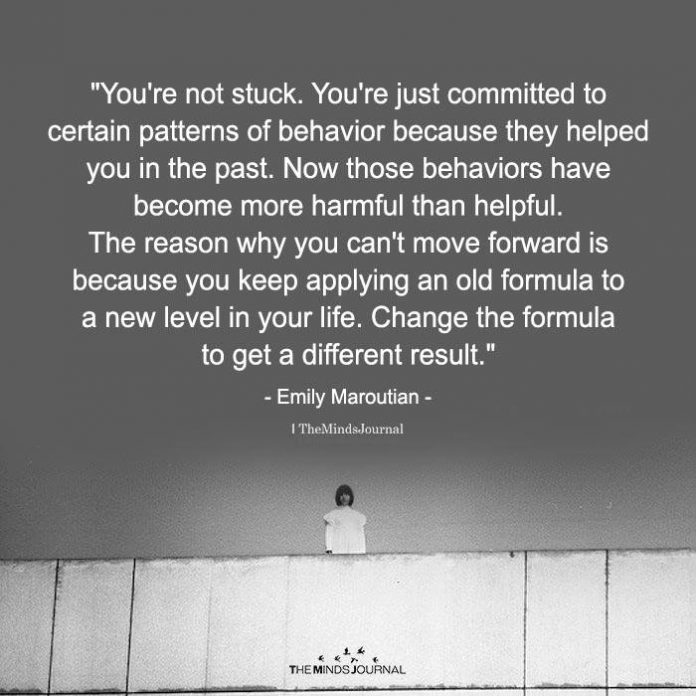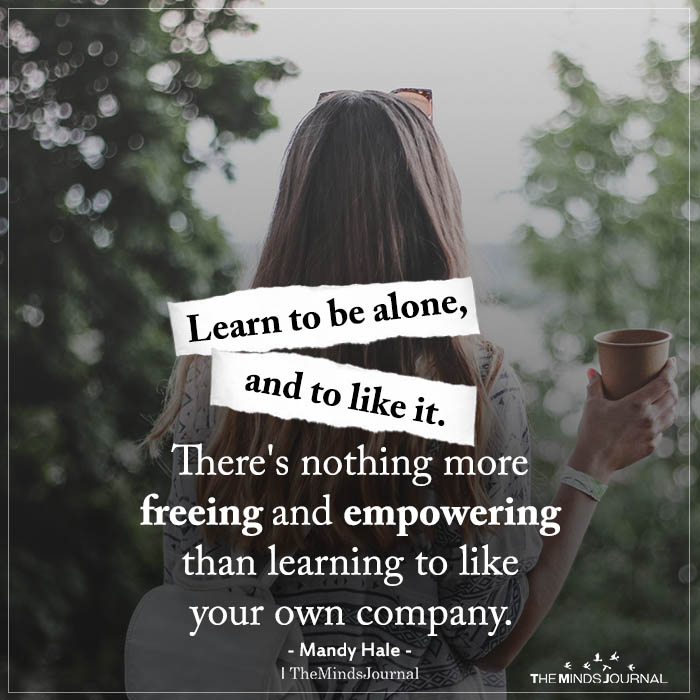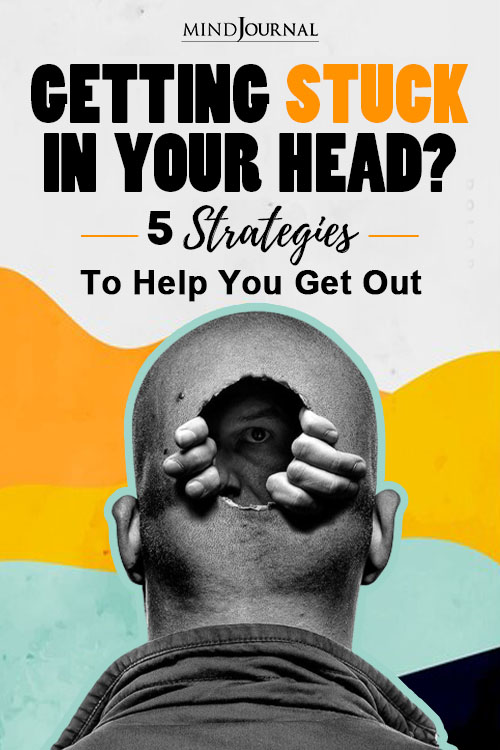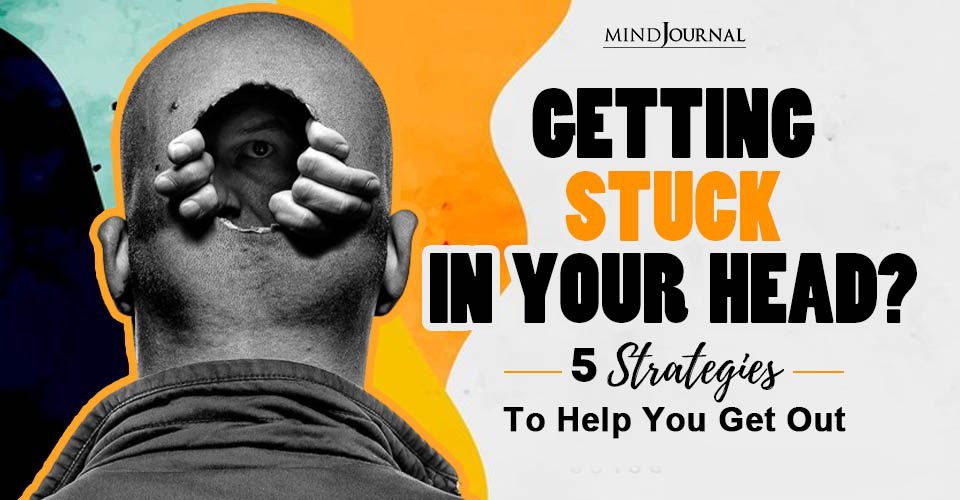Getting stuck in your head doesn’t always yield any good results, to be honest. The more you get stuck in your head, the more you obsess over your thoughts which in turn leads to more negative thinking.
When I was a kid, one of the more consistent comments from teachers was how lost in my own world I could be, the walls could be falling down around me and I would have no idea. Later, as I got older, it would become the running joke amongst my friends, the lunch conversation completely escaped me, never mind my actual classes! I never thought of it as getting stuck, I was simply a daydreamer.
The phrase ‘getting stuck in your thoughts’, will either make perfect sense to you or leave you wondering, what does that mean. If you are reading this, chances are, you are in the first of these two groups.
Getting stuck in your thoughts simply means that you are prone to overthinking, which can also be synonymous with rumination but also confused with just daydreaming.
Related: 5 Steps to Release and Let Go of the Stories You Keep Telling Yourself
Getting Stuck or Just a Daydreamer?
I always thought of it as just zoning out. I would come home from school, put my music on and just lay on my bed staring at the ceiling while I analyzed the day’s events. It could be a few minutes or a few hours… scanning and replaying the many conversations, interactions, and events that took place around me that day.
When I think back on it, the thoughts definitely skewed negative, reinforcing the many negative ideas about how I didn’t measure up. Does this sound familiar?
Many of us struggle with this dilemma of sorts, I have actually found that when I am not able to get lost in my thoughts I can feel myself craving it. It might be why today, I enjoy alone time so much when I can simply lose myself to the inner world of my thoughts and ideas. It’s kind of a love-hate thing, losing yourself to the inner world of your mind.
My life today does not allow me to get lost in my thoughts the way I could at one point, it feels as though there are constant demands on my attention which is even frustrating at times, despite the fact that I know this is not such a bad thing, after all, is getting stuck in your head ever a good thing?
The Difference Between Getting Stuck and Daydreaming
These thought patterns, for me, persisted for quite a few years and ultimately led me to a pretty dark place. Years later I can see how this pattern developed and didn’t quite serve me, I never would have thought of my “daydreaming” as getting stuck in my head or intrusive thoughts.
Despite the fact that I couldn’t control them, that was just me, or so I thought. And I loved to think, as I’ve mentioned, it helped me sort through the flood of feelings and ideas I had floating around in my very noisy head.
My experience with these types of thought patterns is not very different from many of you. We all have that inner dialogue going on, to one extent or another.
The question to ask yourself is where do your thoughts take you? Are you rehashing all of the things you feel you messed up in a day? Or are you thinking about ideas, things you want to do, possibly creative projects? This is where maybe it is more about the destination, not the journey, though the journey (thought pattern) is important as well. Let’s dive into that a little more.
Related: How To Shift Your Mindset Towards More Optimism and Happiness
Thinking that Supports Positive Growth
Thoughts lead to feelings. Our thought process can help us to find the answers and work through the feelings associated with the experiences that we are having or had. I have always been someone that really needs to understand a situation, to fully comprehend “the why”. But as is the case with all things, it’s about balance. Are your thoughts and inner dialogue balanced? How does the balance stack up for you?
If our thoughts give us insight and awareness, that is a good thing. If our thoughts give us ideas and hope for the future that is a good thing. If we notice that we go negative with our thoughts and feelings, then that is something to pay attention to. If we feel that our future is more dim than bright, that is also something to pay attention to.
If the latter of these two things is happening with more frequency and greater intensity, it might be time to talk with someone about that and seek additional support.
There truly are times when I wonder if I was so lost in my head for a part of my life that I actually missed out on valuable time, and experiences happening around me. Not just because of my interpretation of the experience but because I was not present. And mental illness, depression, anxiety, or other mental health disorders will do this.
I think this realization is in part what helped me to make the changes that helped me get out of my head and into my life, which has consequently led me to a more fulfilling life.

Strategies to Get Out of Your Head
As is the case with much of what we talk about here at Upside Down Flan, there’s no secret formula to getting out of your head. However, there are a few approaches or strategies that I think in varying “doses” will help to cut down on the mental chatter floating around up there.
These are some of the strategies that I have used which actually end up being backed by science and research, how about that!
#1 Exercise and Physical Activity
Over the course of my life, I have always been very athletic. It was something that I was decent at and gave me the outlet I needed. I realize now, just how important that outlet was. As a teen, I played 3 different high school sports and was an avid skier.
In my young adult life, I turned to the mountains and woods with rock climbing, backpacking, and continued with my passion of becoming a ski instructor. It was also about this time that I entered the realm of endurance sports, running, and biking turned into marathoning and triathlons. If it kept me active, and outside, I was into it.
This I realize was not just about exercise but about the mental clarity, it gave me. I can distinctly identify how through my athletic endeavors I worked through my life challenges. I have always said that running is a meditation for me, which it truly is. And of course, there is the physical benefit of it as well.
Not everyone loves to physically work out the way I did, the important piece of this is just being active, walking, biking, running, cleaning your home, this all counts. For anything to work, it has to fit into your life, you might find that when you start with one thing it might turn into something else.
Related: 9 Ways How Simple Morning Exercise Can Boost Your Productivity
#2 Mindfulness and Meditation
This has been more challenging for me. But it is something that I learned to embrace in my late 20s and since then have worked to make it a part of my daily life. Mediation is hard, it takes discipline and the benefits can evade us.
Having a noisy mind, I was always more inclined to get outside and run it off rather than sit with my legs folded reciting a mantra. But I have realized that there are some amazing benefits to meditation or even a step down from meditation, mindfulness, which tends to be the form that works better for me.
One of the easiest ways to find mindfulness is to seek out the things around you that you are grateful for and to appreciate the present. So much of our life is wrapped up in the past or the future, we need to find time for the present.
It really is a gift and I for one recognize how I have squandered a lot of my present life due to persistent and unhealthy thoughts, we can, however, channel that energy to make changes in our lives today.
#3 Get Outside
I don’t think it’s a coincidence that my pastime activities have primarily been outdoors. I always was more inclined to be outside rather than inside, but maybe it was also my body telling me what it needed. More and more research talks about the benefits of time outside and how this can help reduce stress along with symptoms of depression and anxiety. Harvard Medical School published an article with some of this research, which I have linked here.
I notice that I have spent way more time indoors this past year than I normally would and it has made a difference, and not for the better! Building in time for those walks outside is super important.
The next time you step outside, notice the impact. Does your mind feel free and open to the exponential possibility around you? It is there, allow yourself to tap into that energy, bring it into the realm of your awareness.
This is as much of a reminder for myself as for anyone else! This year has no doubt been hard and unusual for so many of us, there is more hope that we are turning a corner, but many of my healthy habits have also suffered. It is ok, nothing is permanent, we will get back there, one step at a time. Starting with a few extra steps outside is one way to slowly bring it back.
#4 Find a Creative Outlet
My creative outlet has mostly come in the form of writing, a big surprise, right?!? So naturally, journaling has been a go-to outlet for me.
Journaling has been the constant in my life, my notebook was easy to pack and I could do it anywhere, capturing my many thoughts and getting them out on paper was an immensely therapeutic process for me. But again, that is what worked for me and my lifestyle. If music or art or gardening or cooking or designing is your outlet, then go with it.
If you want to try your hand at journaling but are not sure where to start, you can download my free journal guide here.
There is lots out there about the benefits of having a creative outlet and how that can impact the quality of your work. The biggest benefit in my mind is the balance that I was talking about before. Life should not be all work or all play. There are times when I have had both, yes too much play, and then times when I had too much work, and neither was good for me.
We need to have something that gives us purpose and meaning, as well as an opportunity to replenish. We are complex beings, and we have many needs, sometimes our work and our play can align, but even so, find that thing that is different and unique from your day-to-day life, it will stretch your brain and body in new, healthy ways.
Related: 7 Science-Backed Benefits Of Journaling
#5 Learn to Enjoy Your Own Company
One of the big differences for me today vs. when I was younger, perhaps the result of a lot of personal work as well as having a fully developed brain, is that although I didn’t mind being lost in my thoughts or that I couldn’t turn them off, I was pretty lonely a lot of the time.
Today, time alone to think, even a vacation on my own doesn’t feel lonely, it feels peaceful and fulfilling and rejuvenating, all the things an escape should be.
Getting to a place where I enjoyed my own company was a process, but once I did, the noise in my head died down. I spent a lot of my 20s and 30s traveling to some of the far-flung corners of the world, a lot of this was with other people but a lot of it was alone and although, all things considered, it wasn’t always bad, it was lonely at times. And as much as I hopped around the globe, I also hopped from relationship to relationship. Searching, searching, searching…
Again, this didn’t all happen overnight, but over time I have discovered the way in which we can think about time alone as not just being lonely but being good with ourselves. Time with yourself can be similar to the way you might be with a friend or partner. It can feel pretty awesome to feel such contentment in your alone time, to be free of the feeling that you are lonely.
This is not to say that you don’t miss people, however, you can miss them and be ok with it. I mentioned in previous articles how when you are in the midst of a mental health challenge you can be in a room full of people and feel lonely. It really is more about the feeling of wholeness that we have with ourselves.

This strategy is more of a mindset shift that allows you the time to get to know yourself and be ok with yourself. We do need to get to know ourselves just like we do anybody else we spend time with. Getting to know yourself, being comfortable with yourself, developing your interests will in time, help you to cut down on the noisy thoughts that sometimes get the better of us.
Join the Upside Down Flan Community, a professional mental health forum where you will learn how you can turn YOUR life right side up, sign up here for my weekly newsletter where you will have access to all of my free mental health tools and easy tips!
Check out Meredith Flanagan’s new website, Right Side Up Therapy now!
Written By Meredith Flanagan Originally Appeared On Upside Down Flan









Leave a Reply
You must be logged in to post a comment.